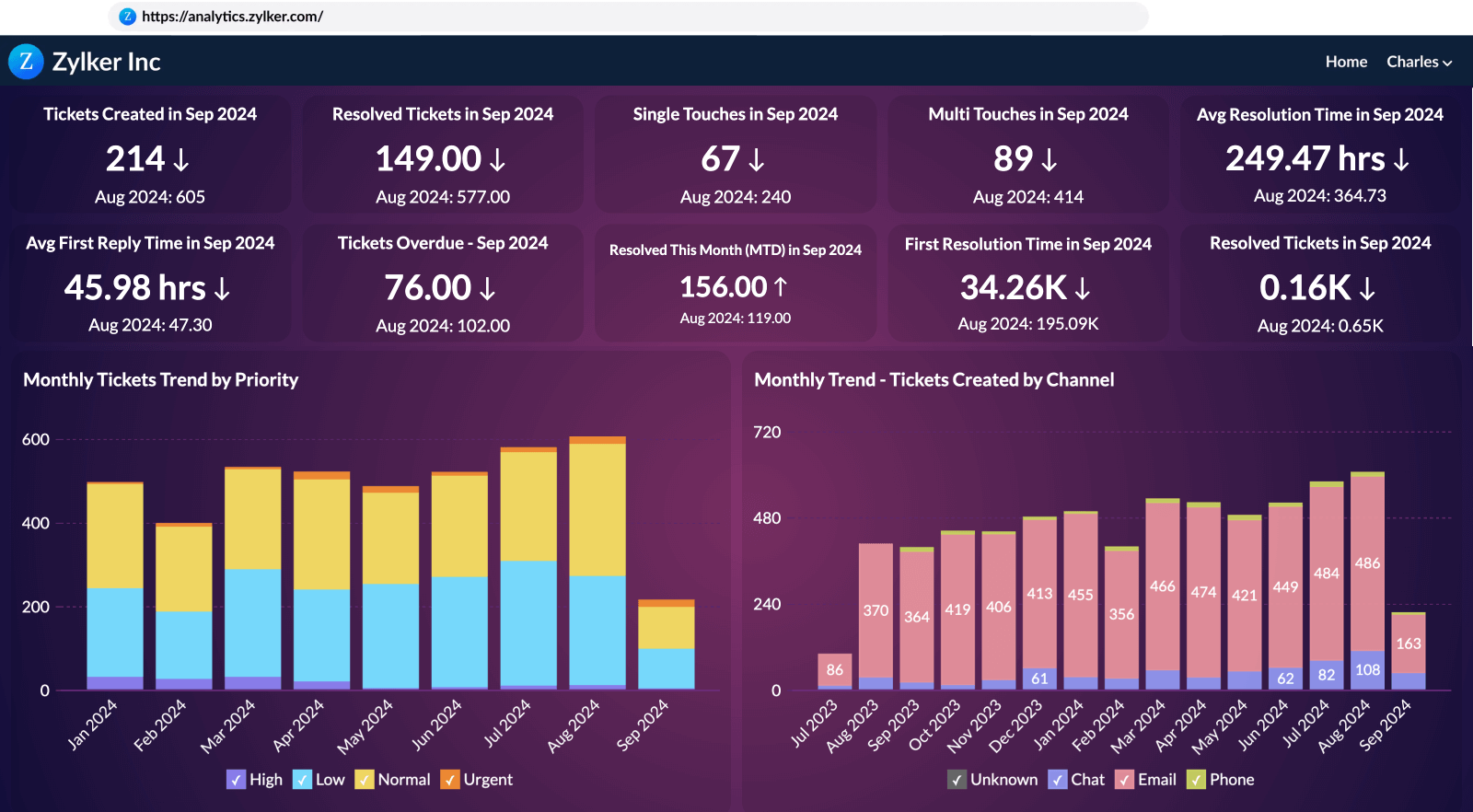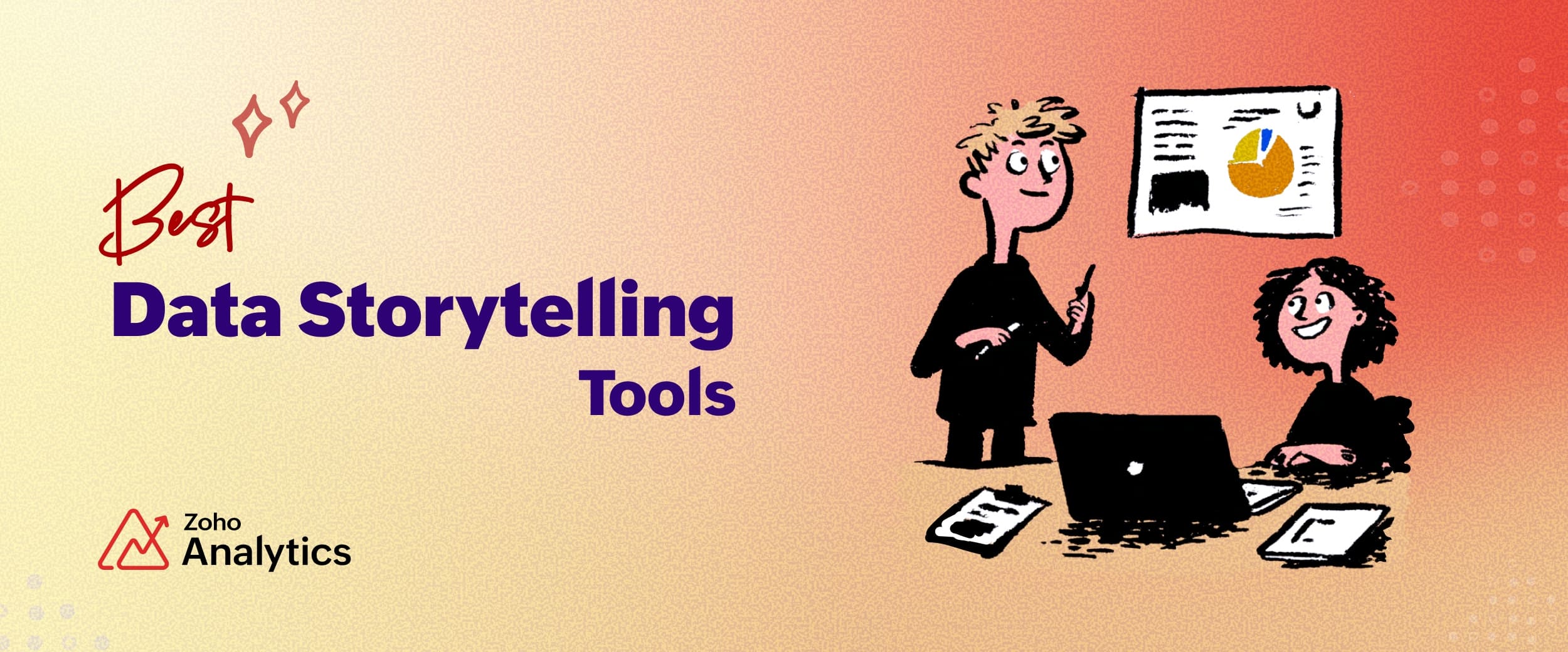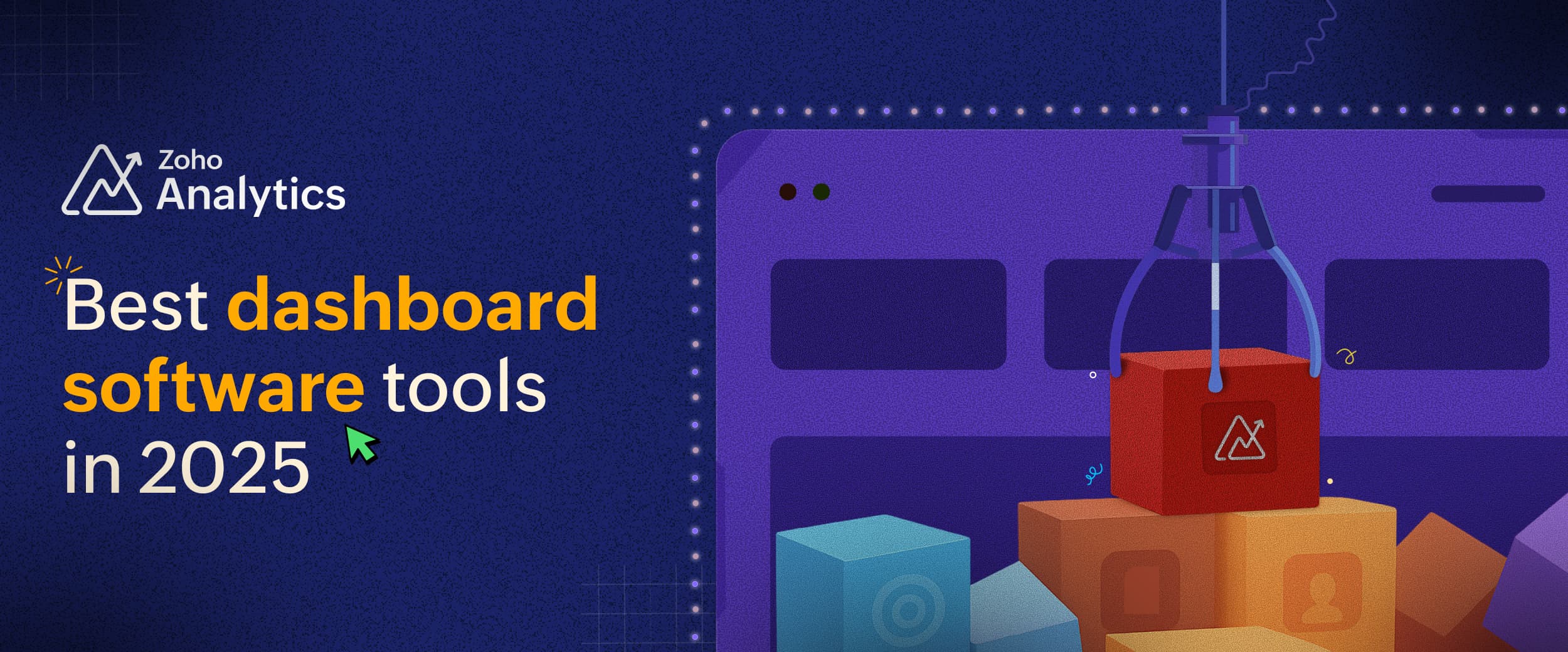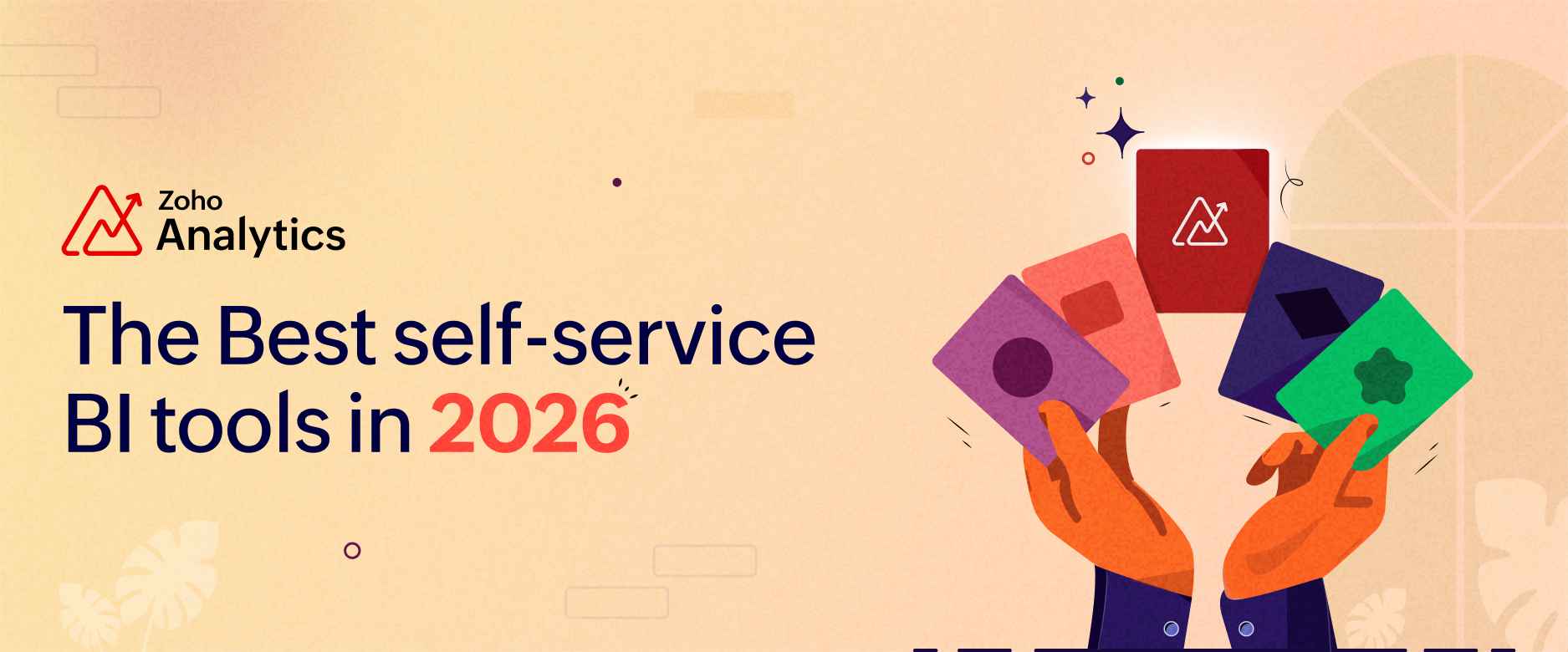- HOME
- BI & Analytics
- Best 5 Domo Alternatives for Data-driven Teams in 2026
Best 5 Domo Alternatives for Data-driven Teams in 2026
- Last Updated : December 11, 2025
- 841 Views
- 9 Min Read
Domo is a cloud-based BI and data analytics tool that helps organizations visualize and analyze data. It provides real-time data integration, interactive dashboards, and collaboration features. Domo connects with various data sources and offers a unified view of business performance, making it a popular choice.
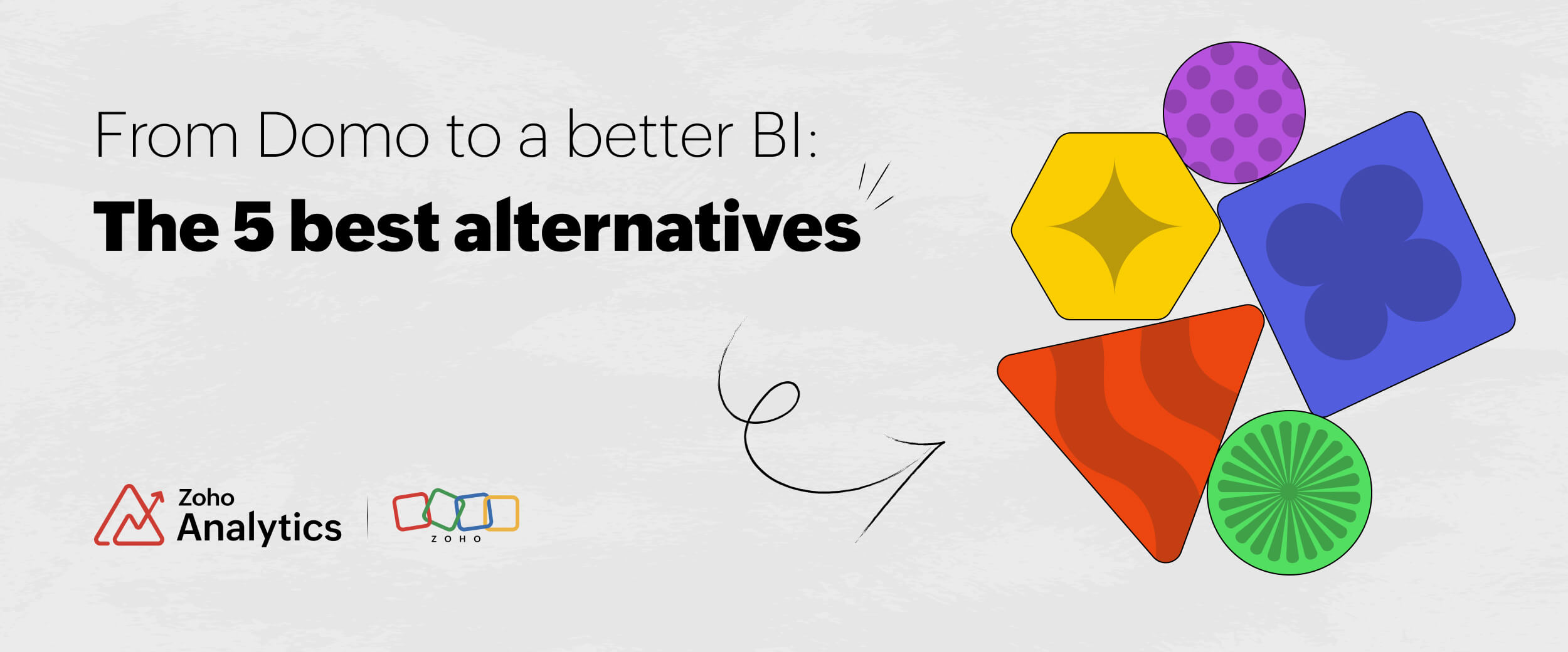
Why you should look for Domo alternatives?
Thinking about switching from Domo? You're not alone. While Domo is a solid BI platform, many teams find themselves running into recurring challenges. One of the biggest pain points teams raise is pricing. Domo doesn;t list clear rates, uses a complex credit-based or consumption model, and users often share quotes of $2.000-$4,000 per month for smaller teams, and scaling up to $10,000+ per month for larger teams.
Beyond costs, users frequently report limitations that slow teams down, especially when working with complex data models or advanced dashboards. Customization can hit a wall when you need flexible data models or visuals, and there's no true semantic layer for consistent metric definitions, which makes complex reporting harder to manage.
Support experiences are mixed too; some customers describe slow or inconsistent responses when they need help, and also the confusion around Domo's consumption based pricing, makes it harder to estimate long-term costs.

Source: Reddit
If unpredictable costs, scalability bottlenecks, and limited customization are slowing your team's analytics, then exploring BI tools that offer transparent pricing, flexible modeling, and smoother scalability might be the better move.
5 Best Domo Alternatives
Tool | Best for | Key strengths | Ease of use | Pricing |
Zoho Analytics | Businesses of all sizes | AI-assisted insights, 500+ data connectors, in-built data prep tool | Very user friendly | Starts at $8/user/month |
Tableau | Data visualization and analysts | Rich interactive dashboards | Moderate | Starts at $15/user/month(Viewer, $42/user/month (Explorer), $75/user/month (Creator)
|
Microsoft Power BI | Microsoft ecosystem users | Deep Office & Azure integration | Moderate | Starts at $14/user/month (Pro), $24/user/month (Premium) |
Looker | SQL-centric & embedded analytics | Advanced data modeling | Technical | Custom pricing |
Qlik | Data exploration & discovery | Associative engine, scalable analytics | Steep learning curve | Custom pricing |
1. Zoho Analytics
Zoho Analytics is a self-service BI and analytics platform that offers AI-powered insights and a user-friendly drag-and-drop interface, making it easy for both beginners and experts. Its built-in data preparation tool allows you to clean, model, transform, and enrich your data effortlessly. With customizable reports and dashboards, businesses can tailor their analytics to their specific needs and share with teams using role-based access control. Unlike Domo, Zoho Analytics provides an affordable pricing model that works well for both startups and enterprises, making it a powerful, scalable, flexible, and cost-effective BI solution. Learn more.
2. Tableau
Tableau is well known for its rich data visualization capabilities and its interactive drag-and-drop interface. It allows you to customize your reports according to the specific needs of your business. Tableau supports real-time analysis, which enables users to explore trends quickly. It integrates with multiple sources but can be complex and costly, particularly for small teams and non-technical users. Despite this, Tableau has been the go-to BI solution for organizations who need detailed visual analysis. Explore how Zoho Analytics compares to Tableau.
3. Microsoft Power BI
Microsoft Power BI is the ideal choice for businesses that already use Microsoft products since it offers deep integrations with Excel, Azure, and other Microsoft services. It provides AI-powered insights and real-time data visualization, making it a powerful choice for enterprises. It's an affordable and user-friendly platform, especially for Microsoft users, but its customization can be complex and requires technical experience. Microsoft Power BI is a top Domo alternative for organizations in the Microsoft ecosystem. Explore how Zoho Analytics compares to Microsoft Power BI.
4. Looker
Looker is a SQL-driven BI platform that stands out with its advanced data modeling through LookML. It's a good choice for businesses already using Google products due to its deep integrations. Its embedded analytics stand out by letting businesses directly add charts into their application. However, it has a higher learning curve and requires technical experience for customization. Despite this, Looker has been the go-to solution for businesses needing embedded analytics. Explore how Zoho Analytics compares to Looker.
5. Qlik
Qlik is known for its associative data modeling, which helps users explore data smoothly and dynamically. For organizations prioritizing data discovery and exploration, Qlik's advanced analytics is a good choice. It's scalable and can handle complex queries and large datasets with better performance. However, its steep learning curve is a barrier for beginners and non-technical users. For businesses seeking flexible and in-depth exploration, Qlik is a great alternative to Domo. Explore how Zoho Analytics compares to Qlik.
Key features to look for in Domo alternatives
1. Ease of Use
Your BI tool should make reporting simple, not complicated. A good alternative to Domo should offer a simple, intuitive interface that doesn't require heavy training or technical expertise. Features like drag-and-drop report builders, pre-built visualization templates, and guided workflows make it easy for even non-technical users to explore data, build reports, and create dashboards. The goal is to get insights faster, without waiting on IT or data experts.
2. Data Connectivity
Your BI tool is only as powerful as the data it can access. The right alternative to Domo should pull in information from variety of data sources including cloud applications, local files and feeds, databases, and even third-party apps through APIs. With all your data flowing into one place, you eliminate silos and create a single, trusted view of your business.
3. Data Preparation
Raw data is often messy. It is filled with duplicates, missing values, or inconsistent formats. A strong Domo alternative should come with an in-built data preparation tool that helps you clean, model, transform, and enrich your data before you start analyzing it. Features like automated data blending, rule-based cleansing, and easy-to-use transformation options can drastically speed up the process. This way, you're always working with reliable, high-quality data.
4. Advanced Analytical Capabilities
Today's businesses need more than just dashboards showing what happened last week. A strong BI tool should go a step further with AI-driven capabilities such as predictive analysis, anomaly detection, trend forecasting, and natural language queries. Even better if it lets you ask questions in plain English and get instant answers. These advanced analytical capabilities turn your data into a tool for smarter, forward-looking decisions.
5. Customization and Collaboration
Every team has different reporting needs, so your BI tool should give you the flexibility to tailor reports and dashboards to fit your goals. Look for a tool that lets you design dashboards your way with custom layouts, branded visuals, calculated metrics, and role-based access. On top of that, collaborative analytics should be seamless. The best BI tool lets you share dashboards, leave comments, and work together in real time so insights turn into action quickly.
6. Scalability and Deployment
As your business grows, so does your data. Whether you're handling larger datasets, adding more users, or expanding to new markets, the right tool should scale without slowing down. Equally important is deployment flexibility. Some businesses prefer cloud-based solutions for accessibility and cost-efficiency, while others may need on-premise options for stricter data governance. A strong Domo alternative should offer multiple deployment models so you can pick what fits best for your organization.
7. Security
Data security isn't optional; it is essential. Look for a BI tool that offers enterprise-grade security features such as role-based access controls, two-factor authentication, encryption, and audit logs. Additionally, compliance with global standards like GDPR, SOC 2, or HIPAA ensures that the platform is committed to protecting your data is safe, private, and always in your control.
8. Affordability
Cost is often the biggest reason businesses look for a Domo alternative. The right BI tool should offer transparent, budget-friendly pricing without any hidden charges for add-ons or features. The best platforms balance robust capabilities like AI, data prep, and collaboration with pricing models that scale fairly as your usage grows, making them accessible to startups, SMBs, and enterprises alike.
Why is Zoho Analytics the best alternative to Domo?
Zoho Analytics is a self-service BI and analytics platform that offers AI-powered insights and a user-friendly drag-and-drop interface, making it easy for both beginners and experts. Its built-in data preparation tool allows you to clean, model, transform, and enrich your data effortlessly. With customizable reports and dashboards, businesses can tailor their analytics to their specific needs and share with teams using role-based access control. Unlike Domo, Zoho Analytics provides an affordable pricing model that works well for both startups and enterprises, making it a powerful, scalable, flexible, and cost-effective BI solution. Learn more.
1. Unified data integration with 500+ data connectors
Zoho Analytics offers one of the industry's widest connector libraries - covering business apps, databases, cloud drives, on-prem systems, and custom APIs.
Highlights:
- 500+ native connectors
- Automated & live sync
- Support for import and live connection
- Easy blending of data across departments within minutes
This eliminates dependency on IT teams and ensures every department can bring data together effortlessly.
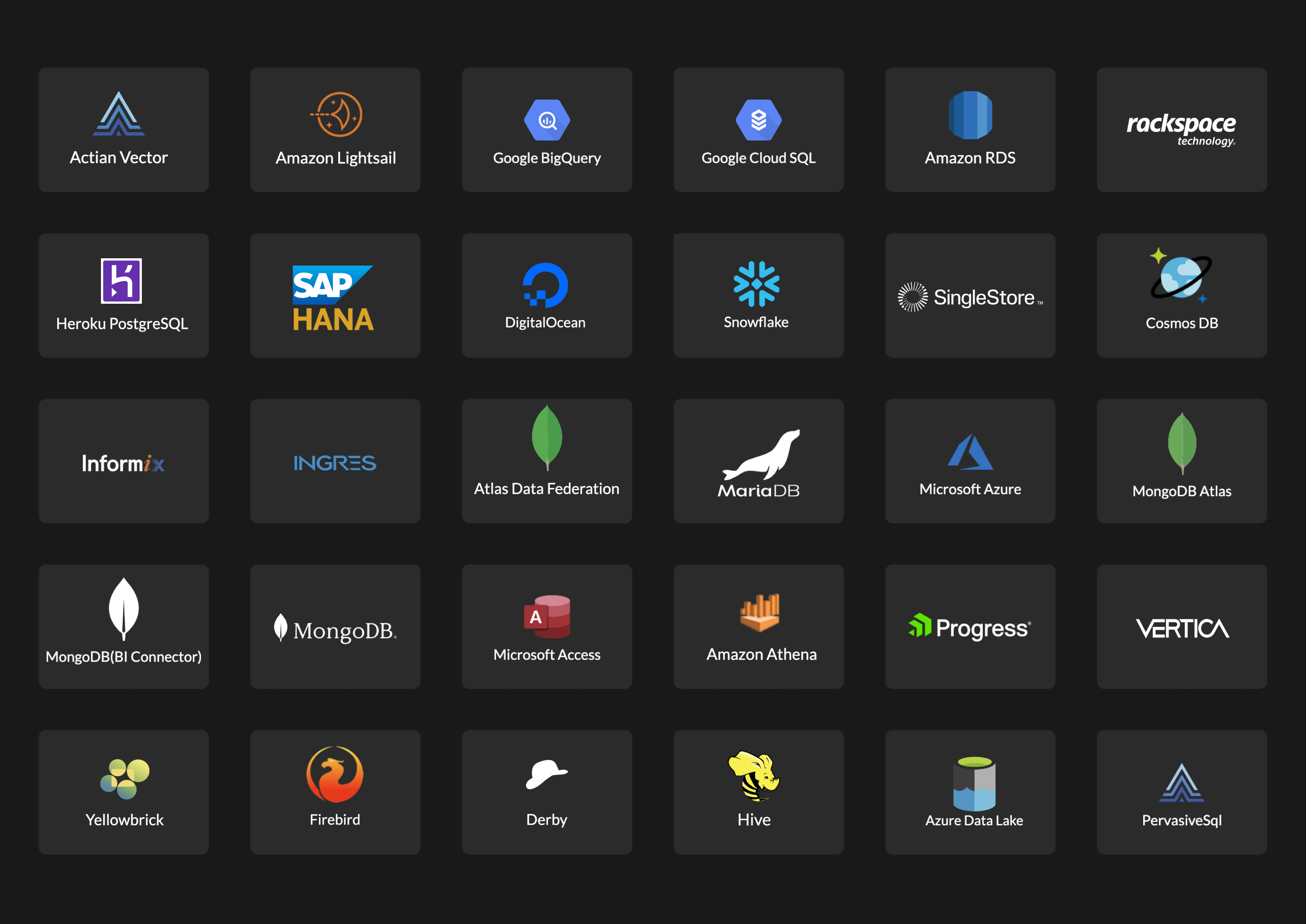
2. Built-in data preparation (No add-ons needed)
Zoho Analytics comes with its own self-service DataPrep engine, eliminating the need for third-party ETL tools. Clean, enrich, transform, and model your data with AI-assisted suggestions - all inside the same platform.
Highlights:
- 250+ transformations options
- Smart cleaning suggestions powered by ML
- Automated pipelines
- Data quality scoring and enrichment
This reduces manual cleanup effort and ensures that analytics are based on accurate, consistent, and properly governed data.
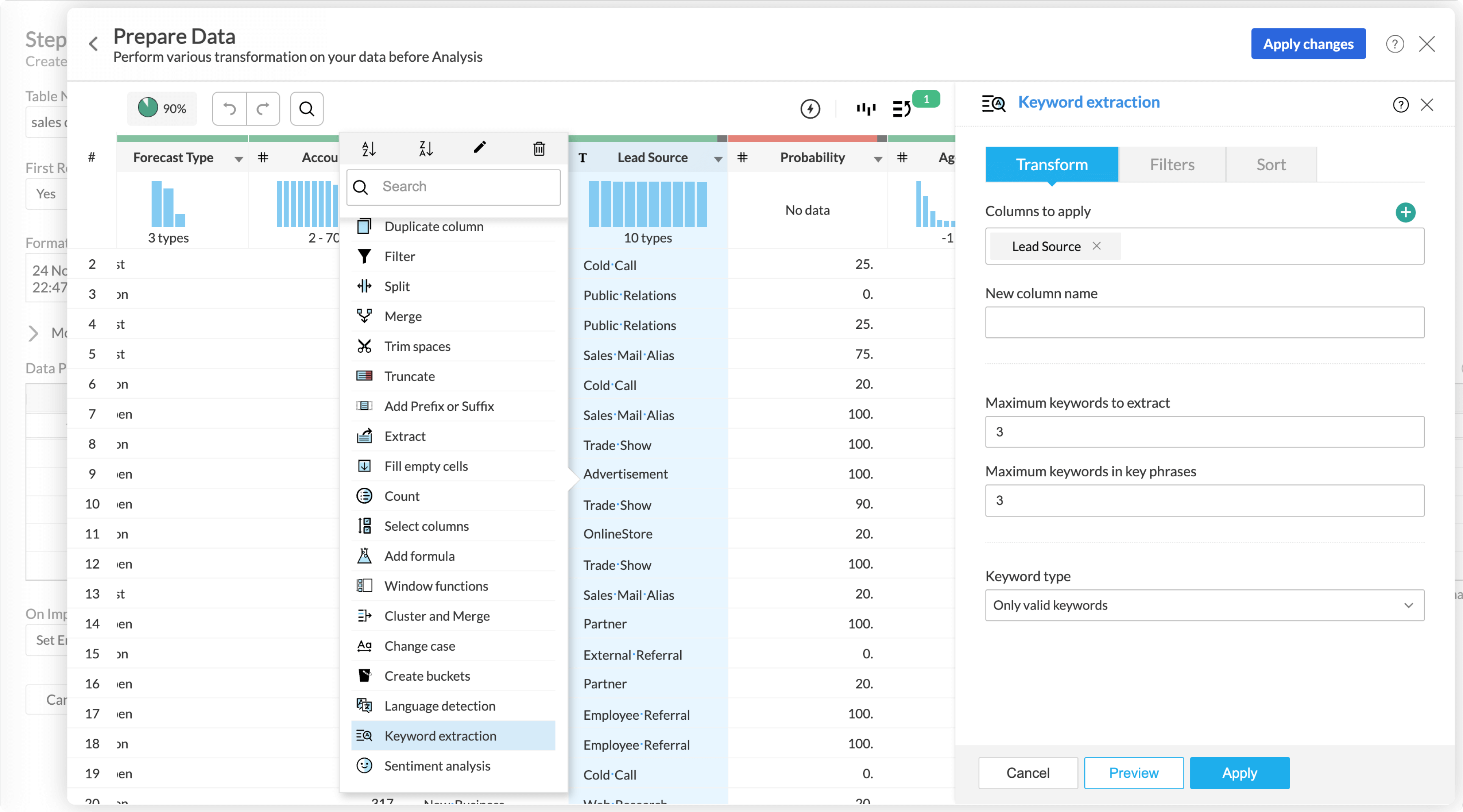
3. Automatic data blending across business apps
Zoho Analytics automatically detects relationships across your datasets and blends them without complex modeling, giving you unified insight without technical complexity.
Highlights:
- Automatic relationship detection
- Cross-department analysis in minutes
- Zero manual modeling
- Faster dashboard creation
Ideal for team that want instant 360° analytics without technical overhead.
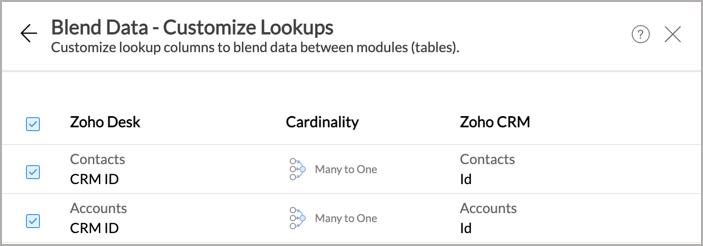
4. Advanced visualization with 50+ chart types
From simple KPIs to advanced analytical views, Zoho Analytics gives you a full-stack data visualization engine designed for depth, clarity, and storytelling. Customize every layout, interactions, and filters to match your needs.
Highlights:
- 50+ chart types
- Funnel and retention charts
- Geo maps, KPI widgets, advanced pivot tables
- Custom dashboards with free-flow layout
You can customize everything - interactions, filters, drill-downs, conditional formatting, and layout design. This allows teams to create dashboards that match their brand and analytical depth.
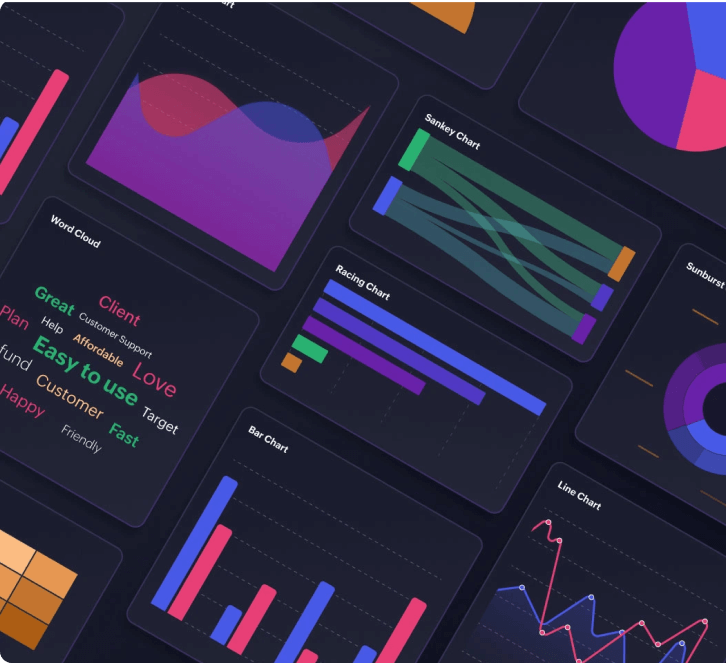
5. AI-powered intelligence with Zia
Zia, Zoho's AI layers, helps your team to uncover insights they might otherwise miss. Whether you need natural-language answers, predictive forecasts, anomaly alerts, or automated narrative summaries - Zia provides intelligence proactively.
Highlights:
- Ask Zia (Get answers via natural language)
- Anomaly detection alerts
- Predictive forecasting using ML
- Smart suggestions for dashboards and charts
This makes analytics truly proactive by notifying you the moment something important changes - not hours later.
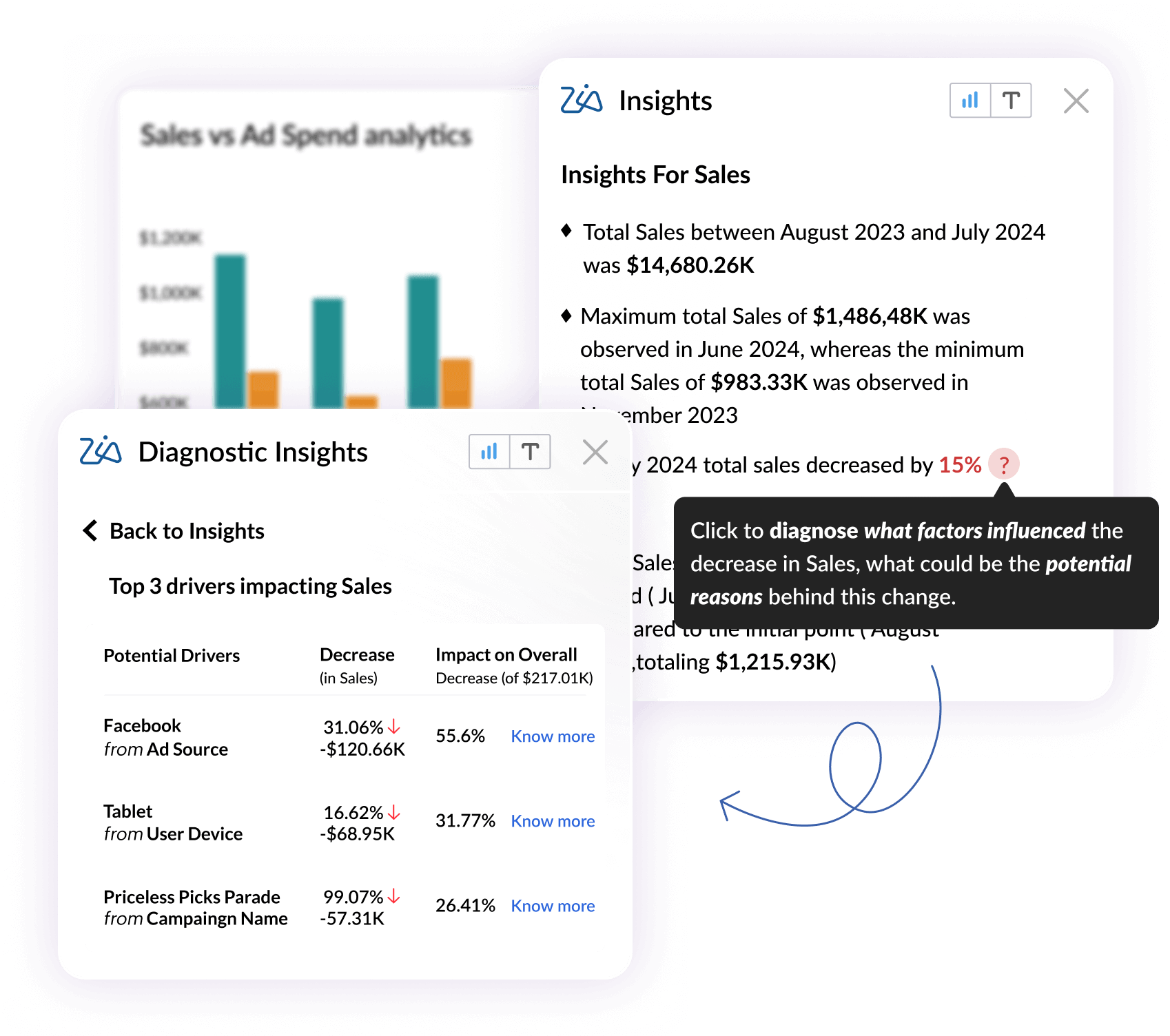
6. Real-time collaboration on dashboards
Collaborate seamlessly without sharing screenshots or creating new threads. Zoho Analytics enables teams to comment on reports, tag peers, attach references, and preserve context - all within the same platform.
Highlights:
- In-dashboard comments
- Start threaded discussions
- Granular access control
- Faster decision-making with live data
This eliminates the need for screenshots on Email and ensures decisions are always backed by data.
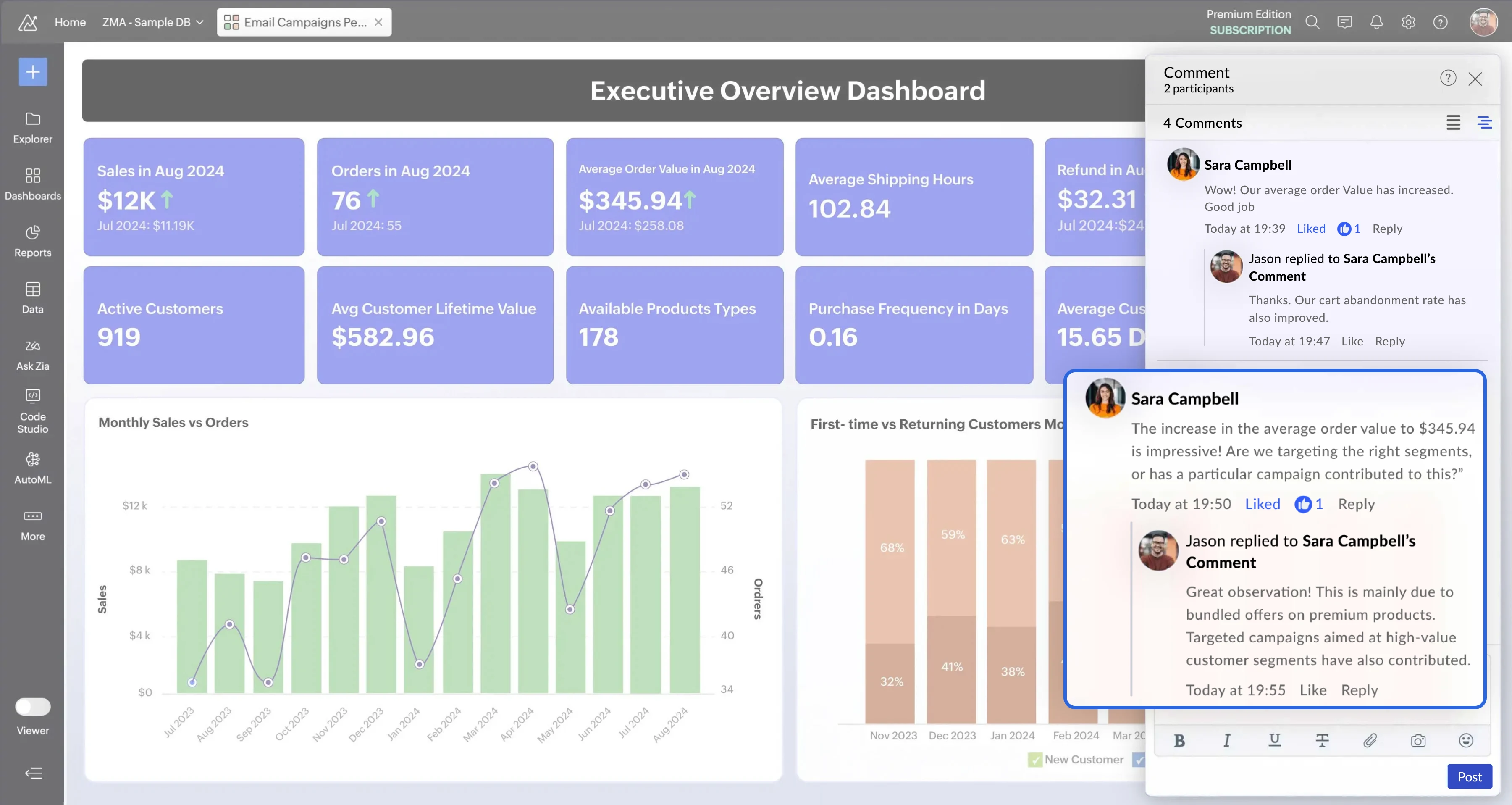
7. Deployment flexibility (Cloud and On-premise)
Zoho Analytics fits seamlessly whether you're a startup or a large enterprise. You can choose cloud or on-premise deployment, and enjoy the same powerful feature set regardless of your choice.
Highlights:
- Fully managed Cloud
- High scalability and elasticity
- Meets strict governance and security needs
- Ideal for industries with compliance requirements
This is extremely valuable for enterprises with strict data residency, compliance, or governance requirements.
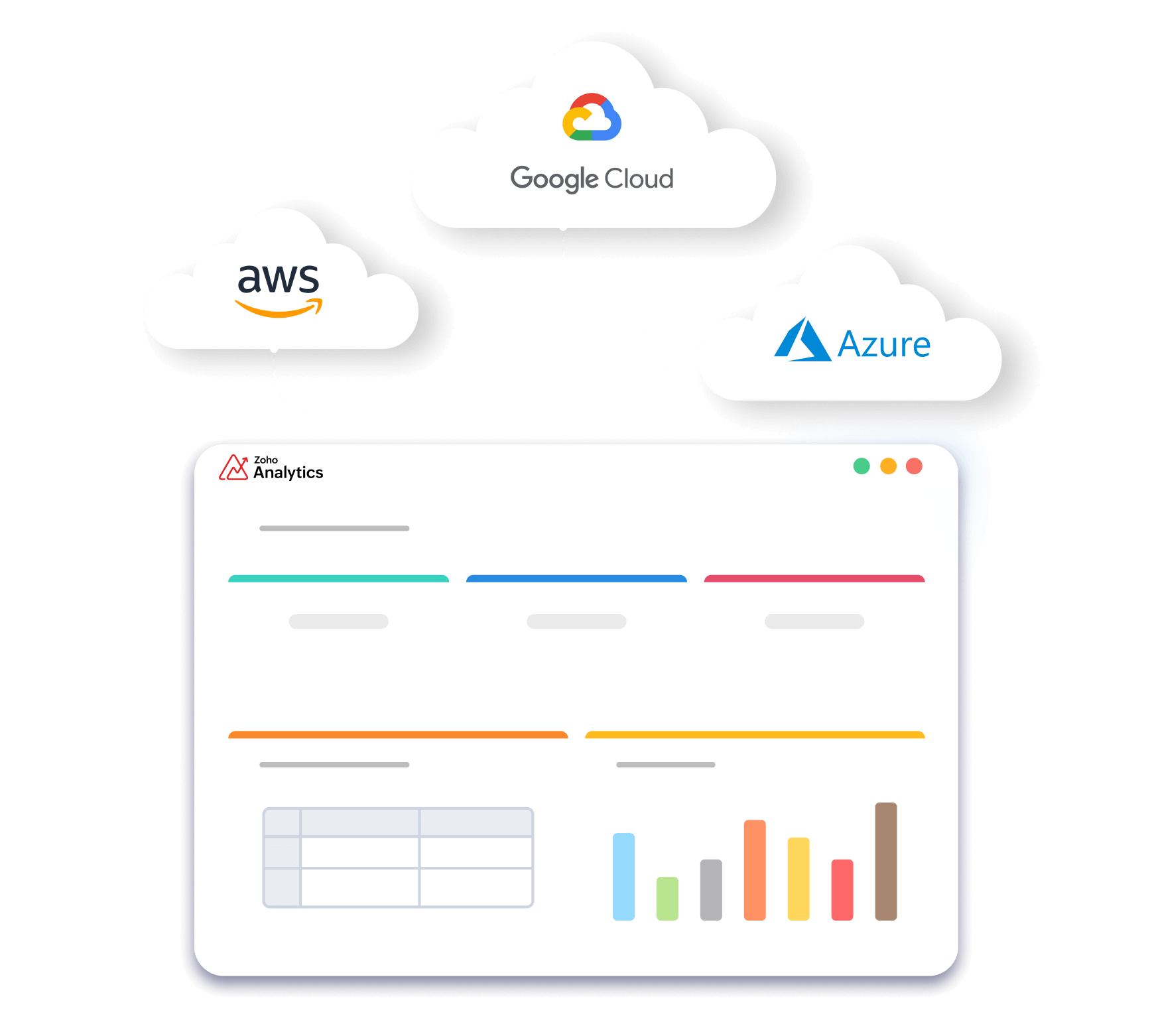
8. White-labeling and Embedded BI
Zoho Analytics makes it easy for you to deliver analytics to customers or partners through embedded BI solution. Customize the UI, embed dashboards, enforce row-level security, and offer analytics as part of your product.
Highlights:
- Complete white-labeling and custom domain
- Fully embeddable dashboards
- Row-level security
- Perfect for Saas, ISVs, OEMs, and enterprises
This is perfect for companies, and enterprises who want to package analytics directly into their products.
The best alternative to Domo: Zoho Analytics
Zoho Analytics is a comprehensive BI solution that provides in-depth data analysis without the complexity or high costs of its competitors. Its AI-powered assistant, Zia, helps users generate automated insights, identify trends, and make data-driven decisions.
The platform seamlessly integrates with 500+ native data connectors, including cloud apps, databases, files and feeds, and third-party tools, helping businesses consolidate all their data in one place. With an intuitive drag-and-drop interface, even non-technical users can create reports easily.
In contrast to Domo's high and inflexible pricing, Zoho Analytics offers scalable pricing plans for businesses of all sizes. It also lets organizations customize their reports and dashboards accordingly.
Overall, Zoho Analytics delivers a robust, AI-driven BI experience with flexibility, affordability, and user-friendliness, making it the best alternative to Domo.
Sign-up for a 15-day free trial or get a personalized demo today!
Make every insight count with Zoho Analytics!
 Vinisha
VinishaVinisha is a Marketing Analyst at Zoho Analytics with a strong passion for both marketing and data. She’s naturally curious about trends and loves diving into data to uncover what drives effective campaigns. She has a knack for simplifying complex information and presents insights in a relatable and engaging way that connects with audiences. Outside of work, she enjoys exploring the creative side of digital marketing.
